Eurovision Song Contest 2012
The Eurovision Song Contest 2012 was the 57th edition of the annual Eurovision Song Contest. It took place in Baku, Azerbaijan, following Ell & Nikki's win at the 2011 contest in Düsseldorf, Germany with the song "Running Scared". It was the first time Azerbaijan had hosted the contest - only four years after the country made its debut. Organised by the European Broadcasting Union (EBU) and host broadcaster İctimai Television (İTV), the contest was held at the Baku Crystal Hall, and consisted of two semi-finals on 22 and 24 May, and the grand final on 26 May 2012. The three live shows were hosted by Leyla Aliyeva, Eldar Gasimov and Nargiz Birk-Petersen.[4][5] It was the first Eurovision Song Contest held in a South Caucasus country.
| Eurovision Song Contest 2012 | |
|---|---|
| Light Your Fire! | |
 | |
| Dates | |
| Semi-final 1 | 22 May 2012 |
| Semi-final 2 | 24 May 2012 |
| Grand final | 26 May 2012 |
| Host | |
| Venue | Baku Crystal Hall Baku, Azerbaijan |
| Presenter(s) | |
| Directed by | Ladislaus Kiraly |
| Executive supervisor | Jon Ola Sand |
| Executive producer | Adil Kerimli |
| Host broadcaster | İctimai Television (İTV) |
| Opening act | Grand final: Alim Qasimov performing a short mugham intro followed by traditional Azerbaijani dancers, Ell & Nikki with "Running Scared" |
| Interval act |
|
| Website | eurovision |
| Participants | |
| Number of entries | 42 |
| Debuting countries | None |
| Returning countries | |
| Non-returning countries | |
Participation map
| |
| Vote | |
| Voting system | Each country awarded 12, 10, 8–1 points to their 10 favourite songs. |
| Nul points | None |
| Winning song | |
Forty-two countries participated in the contest – one less than the record number of 43 set at the previous contest. Montenegro returned to the contest, for the first time since 2009. Meanwhile, Armenia withdrew due to security concerns in relation to the ongoing Nagorno-Karabakh conflict with Azerbaijan. Poland did not participate due to financial concerns.
The winner was Sweden with the song "Euphoria", performed by Loreen and written by Thomas G:son and Peter Boström. This was Sweden's fifth victory in the contest, following their wins in 1974, 1984, 1991 and 1999. Russia, Serbia, Azerbaijan and Albania rounded out the top five. Albania achieved their best result in their Eurovision history. Out of the "Big Five" countries Germany, Italy and Spain all managed to rank within the top 10, finishing eighth, ninth and tenth, respectively.
The lead-up to the contest was met with political concerns and protests surrounding the host country, including its human rights record and allegations by advocacy groups that Baku was carrying out forced evictions in the construction of the contest's venue, along with objections to the contest's presence by Iranian officials – who felt that the event was anti-Islamic because it was, according to them, a "gay parade".
Location
Azerbaijan got the right to host the 2012 edition of the Eurovision Song Contest after winning the previous 2011 edition with the song "Running Scared" performed by Ell & Nikki.[6][7] Baku, the capital and largest city of Azerbaijan, as well as the largest city on the Caspian Sea and of the Caucasus region, was named the host city for the contest, with the venue being the Baku Crystal Hall, built a few months prior to the contest on the city's coastline.
Shortly after Azerbaijan's victory at the 2011 edition, officials announced that a new 23,000-seat concert venue was to be built near National Flag Square in Baku, as a potential venue for the event.[8][9] Three days later, other venue options were revealed by organisers, such as the 37,000-seat Tofiq Bahramov Stadium and the Heydar Aliyev Sports and Exhibition Complex.[10] On 2 August 2011, Alpine Bau Deutschland AG was awarded the contract to construct the Baku Crystal Hall. Preparations for construction began in the area shortly after the announcement.[11] Even though the full cost of the contract was not named, the government allocated 6 million AZN for the construction of the venue.[12]

On 8 September 2011, Azad Azerbaijan TV (ATV) reported that Baku Crystal Hall would be the venue of the contest, but no formal confirmation was made at the time by the EBU. On 31 October 2011, Ismayil Omarov, the director general of Azerbaijani national broadcaster İctimai Television announced that a decision on the venue choice would be taken by the steering committee in January 2012.[13] On 25 January 2012, it was confirmed that the Baku Crystal Hall would be the venue of the contest.[14] Even though the venue had an extended capacity of 23,000 people, only 16,000 people were able to attend each show.[14] Tickets for the contest became available online for purchase on 28 February 2012.[15][16]
Format
.jpg.webp)
In a meeting of the Eurovision Reference Group on 29 June 2011,[17] it was decided that the televoting system would revert the format used most recently in the 2009 Contest, in which the phone and SMS lines opened for a fifteen-minute window after all songs had been performed, instead of opening before the show starts, which was the system used between 2010 and 2011. The results format of each show remained the same with each country's votes being decided on a 50:50 split between televoting and a national jury. Each participating country had their own national jury, which consisted of five professional members of the music industry.[18]
Under the official rules released on 24 November 2011, the number of participants in the grand final was raised to 26, including the host nation, the "Big Five", and the ten qualifiers from each semi-final. This was the second time in the Eurovision Song Contest that 26 countries were in the grand final, the first being the 2003 Contest.[18][19][20]
Semi-final allocation draw
.jpg.webp)
The draw that determined the semi-final running order was held on 25 January 2012 at the Buta Palace. The participating countries, excluding the automatic finalists (Azerbaijan, France, Germany, Italy, Spain and the United Kingdom), were split into six pots, based upon how those countries voted in past contests. From these pots, half (or as close to half as possible) competed in the first semi-final on 22 May 2012. The other half in that particular pot competed in the second semi-final on 24 May 2012.[21] This draw also acted as an approximate running order, in order for the delegations from the countries to know when their rehearsals would commence and determine which semi-final the automatic finalists would be allowed to vote in.[22][23]
| Pot 1 | Pot 2 | Pot 3 | Pot 4 | Pot 5 | Pot 6 |
|---|---|---|---|---|---|
- 1.^ Armenia withdrew after the semi-final allocation draw.
Graphic design

The design of the contest was built around the motto "Light your fire!", inspired by the nickname of Azerbaijan itself, "Land of Fire".[24]
Each introductory video postcard began with a shot of the artist and performers, followed with the flag and country name in a handwritten font with a background resembling the yellow, orange and red fire of the 2012 theme art.[25] The postcards consisted of various shots of Azerbaijan, with a caption displaying 'Azerbaijan' and underneath 'Land of ...' (e.g. Land of Abundance; Land of Poetry etc.), which were then followed by the name of a town or geographic feature, showing the landscape and culture of the country.[25] Some postcards focused on the host city of Baku with text changing to 'Baku' and underneath 'City of ...' (e.g. City of Jazz; City of Leisure etc.). The postcards finished with a shot of the Crystal Hall displayed in the colours of the performing country's flag. These postcards acted as a tourism mechanism to present the country to a wider audience.[25][26]
The artist, song and number graphics as well as tables and voting graphics were kept the same as those used in 2011, with a slight modification to incorporate the 2012 theme art.[25] The lower points (1-7) were highlighted in red squares while the top points (8, 10, 12) were highlighted in orange squares with each square increasing in size in relation to the point value. Both sets of graphics were designed by London brand design agency Turquoise Branding.[27][28]
National host broadcaster
İctimai Television (İTV), which was the EBU member that broadcast the Eurovision Song Contest in Azerbaijan, is one of country's public-service broadcasters.[29][30] Deputy Minister of Communication and Information Technology of Azerbaijan, Iltimas Mammadov, stated that telecom networks were ready to host the event. Azerbaijan's largest telecommunications operator, Azercell, was chosen as the presenting partner for the contest.[31] On 1 December 2011, İTV named the German production company Brainpool as its official production partner for the contest, citing the quality of its work on the previous year's contest.[32]
Participating countries

On 17 January 2012, the EBU announced that initially forty-three countries would take part in the 2012 contest.[33] The 57th edition saw the return of Montenegro, who was last represented by Andrea Demirović in 2009.[34] Poland decided not to participate, due to the financial burden of the UEFA Euro 2012 (which Poland co-hosted with Ukraine) and the 2012 Summer Olympics.[33] Armenia, who had originally planned to participate, later withdrew their application due to security fears of the continuous Nagorno-Karabakh conflict with Azerbaijan, subsequently reducing the number of participating countries to 42.[35]
Returning artists
Four artists returned in this year's contest. Kaliopi for Macedonia who previously participated in the 1996 contest with the song "Samo ti", which placed in 26th position in the pre-qualifying round.[36][37] Kaliopi would then go on to represent Macedonia once more at the Eurovision Song Contest 2016.
Jónsi for Iceland[38] and Željko Joksimović for Serbia[39] both previously participated in 2004. Joksimović had represented Serbia and Montenegro in 2004 with the song "Lane moje" which placed second in that year, and co-hosted the 2008 Contest with Jovana Janković. Jónsi performed "Heaven" in 2004, which placed 19th.[40]
For a second consecutive year Jedward participated for Ireland, after their 8th-place finish at the 2011 Contest with the song "Lipstick".[41][42]
Martina Majerle, who represented Slovenia in 2009, returned as a backing vocalist for Slovenia.
Lys Assia, the winner of the first Eurovision Song Contest in 1956, had entered her song "C'était ma vie" written by Ralph Siegel and Jean Paul Cara into the Swiss national selection for the 2012 contest.[43][44] The song, however, only came eighth in a closely fought national selection. Assia attended the event in Baku as a guest of honour.[45]
Languages
The Finnish entry, "När jag blundar", sung by Pernilla Karlsson, was only Finland's second entry in Swedish (after "Fri?" by Beat in 1990) and the first entry at all to be sung in Swedish since 1998. Russia's entry, "Party for Everybody", sung by Buranovskiye Babushki, was the first entry ever to be performed in Udmurt. The Georgian entry, "I'm a Joker" was the first Eurovision entry containing the Georgian language while the Bulgarian song "Love Unlimited" had a few words in the Azerbaijani language, both of whom never appeared at the contest before.
Semi-final 1
Azerbaijan, Italy and Spain voted in the first semi-final.[21] The EBU allowed the Albanian broadcaster Radio Televizioni Shqiptar (RTSH) to defer transmission and only use jury votes due to a serious bus accident in the country.[46]
Notes
- 2.^ Contained some phrases in Montenegrin and German.
- 3.^ Although the song was completely in Albanian, the title is in Latin.
- 4.^ Contained some phrases in Italian.
- 5.^ Specifically Mühlviertlerisch, a Central Bavarian dialect spoken in Upper Austria.
- 6.^ Although the song was completely in English, the title was in Romanian.
Semi-final 2
France, Germany and the United Kingdom voted in the second semi-final. Germany requested that they vote in this semi-final.[21] Before it withdrew, Armenia was drawn to perform in the first half of this semi-final.[35]
Notes
- 8.^ The song also contained phrases in Arabic, Azerbaijani, English, French, Greek, Italian, Romani, Serbo-Croatian, Spanish and Turkish.[50]
- 9.^ Bulgaria received the same number of points as 10th placed Norway. In accordance with the applicable tiebreak rule, as the number of countries that voted for Norway (11) was higher than the number for Bulgaria (10), this resulted in Norway qualifying to the grand final over Bulgaria.
Grand final
Scoreboard
The EBU and PwC audit company checked and verified the individual jury and televoting results, which were combined to create the overall national vote for the contests. On 18 June 2012, the EBU published the following results.[51][52]
Semi-final 1
| Semi-final 1 | ||||||
|---|---|---|---|---|---|---|
| Place | Televoting | Points | Jury | Points | ||
| 1 | 189 | 131 | ||||
| 2 | 132 | 107 | ||||
| 3 | 131 | 103 | ||||
| 4 | 116 | 90 | ||||
| 5 | 110 | 87 | ||||
| 6 | 99 | 81 | ||||
| 7 | 85 | 76 | ||||
| 8 | 79 | 75 | ||||
| 9 | 53 | 72 | ||||
| 10 | 49 | 72 | ||||
| 11 | 39 | 70 | ||||
| 12 | 36 | 57 | ||||
| 13 | 25 | 45 | ||||
| 14 | 24 | 42 | ||||
| 15 | 18 | 38 | ||||
| 16 | 16 | 28 | ||||
| 17 | 15 | 27 | ||||
| 18 | 2 | 17 | ||||
| Voting results[53] | |||||||||||||||||||||||
|---|---|---|---|---|---|---|---|---|---|---|---|---|---|---|---|---|---|---|---|---|---|---|---|
| Montenegro | 20 | 12 | 8 | ||||||||||||||||||||
| Iceland | 75 | 5 | 5 | 5 | 4 | 5 | 10 | 4 | 3 | 8 | 10 | 1 | 4 | 2 | 2 | 1 | 6 | ||||||
| Greece | 116 | 10 | 5 | 8 | 12 | 3 | 8 | 3 | 7 | 12 | 4 | 5 | 1 | 10 | 10 | 10 | 5 | 3 | |||||
| Latvia | 17 | 2 | 4 | 4 | 4 | 3 | |||||||||||||||||
| Albania | 146 | 12 | 3 | 10 | 4 | 4 | 12 | 10 | 5 | 5 | 10 | 10 | 7 | 2 | 10 | 12 | 1 | 1 | 12 | 12 | 4 | ||
| Romania | 120 | 7 | 4 | 8 | 5 | 2 | 4 | 8 | 6 | 6 | 1 | 8 | 3 | 5 | 12 | 12 | 7 | 10 | 12 | ||||
| Switzerland | 45 | 2 | 7 | 3 | 2 | 1 | 1 | 2 | 8 | 3 | 8 | 8 | |||||||||||
| Belgium | 16 | 4 | 2 | 1 | 2 | 6 | 1 | ||||||||||||||||
| Finland | 41 | 7 | 6 | 1 | 1 | 1 | 2 | 8 | 12 | 3 | |||||||||||||
| Israel | 33 | 1 | 5 | 3 | 1 | 3 | 6 | 5 | 7 | 2 | |||||||||||||
| San Marino | 31 | 4 | 2 | 10 | 7 | 5 | 3 | ||||||||||||||||
| Cyprus | 91 | 6 | 12 | 12 | 3 | 6 | 7 | 3 | 1 | 10 | 7 | 3 | 5 | 1 | 7 | 8 | |||||||
| Denmark | 63 | 8 | 1 | 8 | 3 | 10 | 8 | 4 | 4 | 3 | 1 | 7 | 6 | ||||||||||
| Russia | 152 | 8 | 6 | 7 | 12 | 6 | 8 | 12 | 12 | 12 | 2 | 7 | 12 | 7 | 10 | 6 | 8 | 8 | 2 | 7 | |||
| Hungary | 52 | 7 | 8 | 6 | 6 | 4 | 5 | 5 | 4 | 5 | 2 | ||||||||||||
| Austria | 8 | 1 | 5 | 2 | |||||||||||||||||||
| Moldova | 100 | 3 | 6 | 2 | 4 | 10 | 7 | 6 | 6 | 5 | 3 | 6 | 12 | 2 | 6 | 2 | 6 | 4 | 10 | ||||
| Ireland | 92 | 1 | 10 | 3 | 10 | 7 | 7 | 7 | 12 | 2 | 10 | 6 | 8 | 4 | 5 | ||||||||
12 points
Below is a summary of the maximum 12 points each country awarded to another in the first semi-final:
| N. | Contestant | Nation(s) giving 12 points |
|---|---|---|
| 5 | Albania | Austria, Azerbaijan, Italy, Montenegro, Switzerland |
| Russia | Belgium, Denmark, Finland, Israel, Latvia | |
| 3 | Romania | Ireland, Moldova, Spain |
| 2 | Cyprus | Greece, Iceland |
| Greece | Cyprus, Romania | |
| 1 | Finland | Hungary |
| Ireland | San Marino | |
| Moldova | Russia | |
| Montenegro | Albania |
Semi-final 2
| Semi-final 2 | ||||||
|---|---|---|---|---|---|---|
| Place | Televoting | Points | Jury | Points | ||
| 1 | 180 | 145 | ||||
| 2 | 148 | 141 | ||||
| 3 | 128 | 109 | ||||
| 4 | 114 | 102 | ||||
| 5 | 88 | 97 | ||||
| 6 | 72 | 77 | ||||
| 7 | 70 | 66 | ||||
| 8 | 63 | 62 | ||||
| 9 | 59 | 58 | ||||
| 10 | 51 | 55 | ||||
| 11 | 39 | 52 | ||||
| 12 | 37 | 49 | ||||
| 13 | 37 | 42 | ||||
| 14 | 34 | 40 | ||||
| 15 | 32 | 40 | ||||
| 16 | 27 | 31 | ||||
| 17 | 24 | 27 | ||||
| 18 | 15 | 25 | ||||
| Voting results[54] | |||||||||||||||||||||||
|---|---|---|---|---|---|---|---|---|---|---|---|---|---|---|---|---|---|---|---|---|---|---|---|
| Serbia | 159 | 12 | 10 | 5 | 8 | 8 | 8 | 12 | 12 | 10 | 8 | 10 | 1 | 8 | 10 | 10 | 2 | 12 | 10 | 3 | |||
| Macedonia | 53 | 8 | 1 | 2 | 5 | 7 | 6 | 7 | 1 | 8 | 8 | ||||||||||||
| Netherlands | 35 | 2 | 1 | 7 | 7 | 3 | 3 | 8 | 4 | ||||||||||||||
| Malta | 70 | 3 | 2 | 2 | 5 | 6 | 6 | 4 | 5 | 4 | 4 | 6 | 3 | 2 | 6 | 12 | |||||||
| Belarus | 35 | 1 | 1 | 4 | 12 | 2 | 8 | 7 | |||||||||||||||
| Portugal | 39 | 6 | 3 | 3 | 1 | 5 | 5 | 4 | 1 | 8 | 3 | ||||||||||||
| Ukraine | 64 | 4 | 3 | 6 | 12 | 2 | 5 | 1 | 6 | 6 | 5 | 1 | 2 | 2 | 5 | 2 | 2 | ||||||
| Bulgaria | 45 | 2 | 6 | 2 | 6 | 10 | 6 | 3 | 3 | 2 | 5 | ||||||||||||
| Slovenia | 31 | 10 | 4 | 8 | 5 | 4 | |||||||||||||||||
| Croatia | 42 | 12 | 7 | 1 | 1 | 8 | 12 | 1 | |||||||||||||||
| Sweden | 181 | 7 | 8 | 12 | 8 | 7 | 10 | 7 | 10 | 10 | 6 | 12 | 5 | 12 | 12 | 12 | 7 | 10 | 6 | 12 | 8 | ||
| Georgia | 36 | 6 | 1 | 10 | 3 | 4 | 12 | ||||||||||||||||
| Turkey | 80 | 10 | 7 | 12 | 2 | 8 | 7 | 3 | 2 | 3 | 1 | 6 | 7 | 6 | 6 | ||||||||
| Estonia | 100 | 8 | 4 | 12 | 3 | 3 | 1 | 12 | 7 | 10 | 8 | 8 | 10 | 7 | 7 | ||||||||
| Slovakia | 22 | 1 | 7 | 4 | 3 | 6 | 1 | ||||||||||||||||
| Norway | 45 | 3 | 3 | 3 | 3 | 2 | 10 | 4 | 8 | 4 | 1 | 4 | |||||||||||
| Bosnia and Herzegovina | 77 | 5 | 5 | 5 | 5 | 1 | 5 | 12 | 5 | 2 | 12 | 6 | 4 | 4 | 5 | 1 | |||||||
| Lithuania | 104 | 6 | 4 | 10 | 10 | 7 | 4 | 4 | 7 | 4 | 2 | 5 | 2 | 10 | 7 | 7 | 5 | 10 | |||||
12 points
Below is a summary of the maximum 12 points each country awarded to another in the second semi-final:
| N. | Contestant | Nation(s) giving 12 points |
|---|---|---|
| 6 | Sweden | Estonia, Georgia, Germany, Netherlands, Norway, Slovakia |
| 4 | Serbia | Bulgaria, France, Macedonia, Slovenia |
| 2 | Bosnia and Herzegovina | Croatia, Turkey |
| Croatia | Bosnia and Herzegovina, Serbia | |
| Estonia | Portugal, Sweden | |
| 1 | Belarus | Ukraine |
| Georgia | Lithuania | |
| Malta | United Kingdom | |
| Turkey | Malta | |
| Ukraine | Belarus |
Grand final
| Grand final | ||||||
|---|---|---|---|---|---|---|
| Place | Televoting | Points | Jury | Points | ||
| 1 | 343 | 296 | ||||
| 2 | 332 | 173 | ||||
| 3 | 211 | 157 | ||||
| 4 | 176 | 157 | ||||
| 5 | 151 | 154 | ||||
| 6 | 125 | 152 | ||||
| 7 | 117 | 125 | ||||
| 8 | 106 | 118 | ||||
| 9 | 89 | 104 | ||||
| 10 | 89 | 98 | ||||
| 11 | 79 | 94 | ||||
| 12 | 78 | 85 | ||||
| 13 | 75 | 85 | ||||
| 14 | 68 | 82 | ||||
| 15 | 63 | 71 | ||||
| 16 | 57 | 70 | ||||
| 17 | 56 | 69 | ||||
| 18 | 45 | 60 | ||||
| 19 | 39 | 53 | ||||
| 20 | 37 | 53 | ||||
| 21 | 36 | 51 | ||||
| 22 | 20 | 50 | ||||
| 23 | 18 | 30 | ||||
| 24 | 16 | 24 | ||||
| 25 | 10 | 14 | ||||
| 26 | 0 | 11 | ||||
| Voting results[55] | ||||||||||||||||||||||||||||||||||||||||||||
|---|---|---|---|---|---|---|---|---|---|---|---|---|---|---|---|---|---|---|---|---|---|---|---|---|---|---|---|---|---|---|---|---|---|---|---|---|---|---|---|---|---|---|---|---|
| United Kingdom | 12 | 1 | 5 | 2 | 4 | |||||||||||||||||||||||||||||||||||||||
| Hungary | 19 | 7 | 1 | 1 | 8 | 2 | ||||||||||||||||||||||||||||||||||||||
| Albania | 146 | 10 | 1 | 8 | 10 | 1 | 12 | 5 | 10 | 6 | 4 | 12 | 3 | 4 | 5 | 12 | 1 | 5 | 1 | 6 | 3 | 12 | 1 | 6 | 8 | |||||||||||||||||||
| Lithuania | 70 | 1 | 8 | 4 | 4 | 3 | 7 | 5 | 1 | 6 | 3 | 4 | 12 | 5 | 7 | |||||||||||||||||||||||||||||
| Bosnia and Herzegovina | 55 | 6 | 7 | 10 | 1 | 7 | 10 | 2 | 7 | 5 | ||||||||||||||||||||||||||||||||||
| Russia | 259 | 3 | 4 | 4 | 5 | 10 | 12 | 8 | 10 | 3 | 10 | 4 | 3 | 7 | 4 | 3 | 6 | 6 | 8 | 5 | 6 | 3 | 4 | 4 | 8 | 7 | 7 | 8 | 6 | 8 | 8 | 10 | 8 | 8 | 5 | 10 | 7 | 7 | 7 | 7 | 6 | |||
| Iceland | 46 | 4 | 1 | 4 | 5 | 6 | 6 | 4 | 7 | 3 | 6 | |||||||||||||||||||||||||||||||||
| Cyprus | 65 | 6 | 2 | 2 | 12 | 8 | 12 | 5 | 5 | 8 | 2 | 3 | ||||||||||||||||||||||||||||||||
| France | 21 | 2 | 2 | 6 | 6 | 2 | 3 | |||||||||||||||||||||||||||||||||||||
| Italy | 101 | 7 | 2 | 4 | 10 | 7 | 1 | 3 | 5 | 5 | 5 | 2 | 2 | 5 | 5 | 2 | 4 | 4 | 7 | 3 | 1 | 4 | 2 | 5 | 4 | 2 | ||||||||||||||||||
| Estonia | 120 | 1 | 4 | 10 | 4 | 2 | 10 | 7 | 7 | 10 | 8 | 7 | 8 | 8 | 6 | 10 | 4 | 6 | 8 | |||||||||||||||||||||||||
| Norway | 7 | 3 | 1 | 3 | ||||||||||||||||||||||||||||||||||||||||
| Azerbaijan | 150 | 4 | 5 | 12 | 7 | 12 | 4 | 2 | 12 | 5 | 7 | 10 | 10 | 8 | 6 | 2 | 12 | 10 | 3 | 10 | 8 | 1 | ||||||||||||||||||||||
| Romania | 71 | 3 | 6 | 2 | 4 | 7 | 12 | 3 | 4 | 1 | 10 | 7 | 1 | 6 | 5 | |||||||||||||||||||||||||||||
| Denmark | 21 | 5 | 2 | 2 | 5 | 2 | 5 | |||||||||||||||||||||||||||||||||||||
| Greece | 64 | 12 | 8 | 5 | 2 | 5 | 3 | 1 | 4 | 1 | 12 | 1 | 4 | 1 | 3 | 2 | ||||||||||||||||||||||||||||
| Sweden | 372 | 5 | 7 | 10 | 12 | 6 | 6 | 12 | 7 | 6 | 3 | 12 | 12 | 6 | 6 | 8 | 7 | 8 | 7 | 10 | 10 | 7 | 12 | 6 | 12 | 3 | 12 | 12 | 10 | 12 | 12 | 12 | 12 | 12 | 8 | 10 | 12 | 12 | 12 | 12 | 12 | |||
| Turkey | 112 | 10 | 3 | 3 | 7 | 12 | 8 | 5 | 5 | 1 | 4 | 7 | 3 | 8 | 8 | 6 | 1 | 2 | 7 | 8 | 3 | 1 | ||||||||||||||||||||||
| Spain | 97 | 6 | 6 | 6 | 1 | 6 | 8 | 5 | 3 | 8 | 6 | 6 | 12 | 2 | 4 | 4 | 3 | 1 | 10 | |||||||||||||||||||||||||
| Germany | 110 | 2 | 4 | 2 | 7 | 6 | 4 | 2 | 4 | 2 | 10 | 3 | 3 | 10 | 10 | 7 | 3 | 1 | 2 | 8 | 10 | 10 | ||||||||||||||||||||||
| Malta | 41 | 7 | 3 | 8 | 2 | 5 | 2 | 1 | 7 | 6 | ||||||||||||||||||||||||||||||||||
| Macedonia | 71 | 8 | 8 | 3 | 2 | 8 | 12 | 2 | 6 | 8 | 1 | 1 | 12 | |||||||||||||||||||||||||||||||
| Ireland | 46 | 1 | 4 | 1 | 10 | 3 | 5 | 4 | 5 | 4 | 5 | 4 | ||||||||||||||||||||||||||||||||
| Serbia | 214 | 1 | 12 | 5 | 10 | 2 | 5 | 5 | 6 | 8 | 8 | 10 | 3 | 12 | 10 | 12 | 7 | 12 | 7 | 10 | 10 | 5 | 3 | 10 | 10 | 5 | 2 | 6 | 10 | 4 | 4 | |||||||||||||
| Ukraine | 65 | 10 | 3 | 7 | 1 | 8 | 3 | 1 | 1 | 2 | 1 | 6 | 2 | 6 | 3 | 8 | 3 | |||||||||||||||||||||||||||
| Moldova | 81 | 3 | 12 | 1 | 8 | 5 | 8 | 2 | 2 | 1 | 1 | 6 | 7 | 7 | 4 | 7 | 2 | 5 | ||||||||||||||||||||||||||
| Vertically, the table is ordered by appearance in the grand final. Horizontally, the table is ordered by voting order. | ||||||||||||||||||||||||||||||||||||||||||||
12 points
Below is a summary of the maximum 12 points each country awarded to another in the grand final:[55]
| N. | Contestant | Nation(s) giving 12 points |
|---|---|---|
| 18 | Sweden | Austria, Belgium, Denmark, Estonia, Finland, France, Germany, Hungary, Iceland, Ireland, Israel, Latvia, Netherlands, Norway, Russia, Slovakia, Spain, United Kingdom |
| 4 | Albania | Macedonia, Italy, San Marino, Switzerland |
| Azerbaijan | Lithuania, Malta, Turkey, Ukraine | |
| Serbia | Bulgaria, Croatia, Montenegro, Slovenia | |
| 2 | Cyprus | Greece, Sweden |
| Greece | Albania, Cyprus | |
| Macedonia | Bosnia and Herzegovina, Serbia | |
| 1 | Lithuania | Georgia |
| Moldova | Romania | |
| Romania | Moldova | |
| Russia | Belarus | |
| Spain | Portugal | |
| Turkey | Azerbaijan |
No country took nul points (receiving 0 points total) when both scores were added together, but France received 0 points at the televoting stage.
Other countries
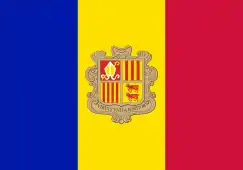 Andorra – On 19 October 2011, Andorra announced that there are no plans for the country to participate in 2012 due to financial difficulties; the country also had planned to withdraw from the EBU entirely.[56][57]
Andorra – On 19 October 2011, Andorra announced that there are no plans for the country to participate in 2012 due to financial difficulties; the country also had planned to withdraw from the EBU entirely.[56][57]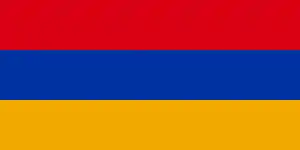 Armenia – On 7 March 2012, the EBU announced that Armenian Public Television (ARMTV) had decided to withdraw from participation despite originally being included in the list of participating countries. Its decision came after President Ilham Aliyev of Azerbaijan gave a speech on 28 February 2012 when he stated "Our main enemies are Armenians of the world and the hypocritical and corrupt politicians under their control."[58][59][60] The country was consequently fined by the EBU and were expected to face further penalties, such as exclusion from participation in future contests if it failed to comply with the EBU requirements.[61][62] Armenia had been in a continuous state of war with Azerbaijan since the early 1990s because of the Nagorno-Karabakh conflict.[63]
Armenia – On 7 March 2012, the EBU announced that Armenian Public Television (ARMTV) had decided to withdraw from participation despite originally being included in the list of participating countries. Its decision came after President Ilham Aliyev of Azerbaijan gave a speech on 28 February 2012 when he stated "Our main enemies are Armenians of the world and the hypocritical and corrupt politicians under their control."[58][59][60] The country was consequently fined by the EBU and were expected to face further penalties, such as exclusion from participation in future contests if it failed to comply with the EBU requirements.[61][62] Armenia had been in a continuous state of war with Azerbaijan since the early 1990s because of the Nagorno-Karabakh conflict.[63] Czech Republic – On 24 November 2011, it was reported that the Czech Republic would not compete at the 2012 contest, following the release of a television schedule by Česká televize (ČT).[64]
Czech Republic – On 24 November 2011, it was reported that the Czech Republic would not compete at the 2012 contest, following the release of a television schedule by Česká televize (ČT).[64]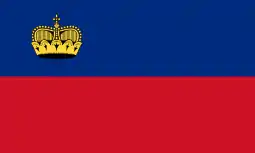 Liechtenstein – On 26 November 2011, it was announced that two official EBU documents, published in March and October 2011, showed Liechtenstein's only national broadcaster 1FLTV as being granted active EBU membership, sparking speculations of a début for the nation.[65] However, on 29 November 2011, these documents were later confirmed as editing mistakes, and thus a début had yet to be planned.[66]
Liechtenstein – On 26 November 2011, it was announced that two official EBU documents, published in March and October 2011, showed Liechtenstein's only national broadcaster 1FLTV as being granted active EBU membership, sparking speculations of a début for the nation.[65] However, on 29 November 2011, these documents were later confirmed as editing mistakes, and thus a début had yet to be planned.[66] Luxembourg – On 31 December 2011, RTL Luxembourg confirmed that Luxembourg would not participate at the Eurovision in Baku.[67]
Luxembourg – On 31 December 2011, RTL Luxembourg confirmed that Luxembourg would not participate at the Eurovision in Baku.[67]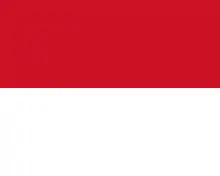 Monaco – It had been reported on 23 November 2011, at an EBU meeting in Geneva, that Monaco were considering a return to the 2012 contest.[68] However, on 3 December 2011, Phil Bosco, a former head of delegation told a French-speaking website that the Monegasque national broadcaster Télé Monte Carlo (TMC) did not intend to return to the Eurovision Song Contest any time in the near future, as there were no financial budget available.[69]
Monaco – It had been reported on 23 November 2011, at an EBU meeting in Geneva, that Monaco were considering a return to the 2012 contest.[68] However, on 3 December 2011, Phil Bosco, a former head of delegation told a French-speaking website that the Monegasque national broadcaster Télé Monte Carlo (TMC) did not intend to return to the Eurovision Song Contest any time in the near future, as there were no financial budget available.[69]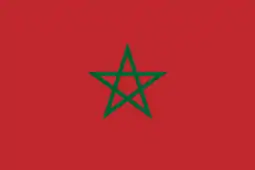 Morocco – In an interview with the French delegation it had been revealed that Morocco were "likely to return" to the Eurovision Song Contest in 2012 with a new broadcaster 2M TV.[70] Reports about the proposed return of Morocco to the contest, after an absence of more than 30 years, were further enhanced at an EBU meeting in Geneva.[68][71]
Morocco – In an interview with the French delegation it had been revealed that Morocco were "likely to return" to the Eurovision Song Contest in 2012 with a new broadcaster 2M TV.[70] Reports about the proposed return of Morocco to the contest, after an absence of more than 30 years, were further enhanced at an EBU meeting in Geneva.[68][71] Poland – On 16 December 2011, it had been reported on the official Facebook page of Telewizja Polska (TVP) that Poland were not returning for the 2012 contest.[72] This was confirmed a few days later, stating that the broadcaster had decided to focus on the 2012 UEFA European Football Championship (which Poland co-hosted with Ukraine) and Summer Olympics. TVP stated that a return in 2013 has not been ruled out.[73][74][75]
Poland – On 16 December 2011, it had been reported on the official Facebook page of Telewizja Polska (TVP) that Poland were not returning for the 2012 contest.[72] This was confirmed a few days later, stating that the broadcaster had decided to focus on the 2012 UEFA European Football Championship (which Poland co-hosted with Ukraine) and Summer Olympics. TVP stated that a return in 2013 has not been ruled out.[73][74][75]
Incidents
Human rights concerns
Azerbaijan's large investment in hosting the Eurovision contest was widely discussed in Western media as an attempt to "mitigate misgivings about its poor democracy and human rights record".[76][77] Elnur Majidli, an activist imprisoned during the Arab Spring-inspired 2011 Azerbaijani protests, was released in an apparent effort to soften Azerbaijan's image ahead of the contest, but many political prisoners remained.[77] Human Rights Watch reported a "violent crackdown on protesters" on the eve of the contest,[78] and Amnesty International condemned the "stern crackdown of freedom of expression, dissent, non-governmental organizations (NGOs), critical journalists, in fact anyone who criticised the Aliyev regime too strongly" that continued up to the contest.[79]
Human Rights Watch also criticised the Azerbaijani government and the Baku City Authority for carrying out forced evictions against local residents, in order to allow for the demolition of flats to make way for construction in the neighbourhood where the Baku Crystal Hall was built.[80] The Public Association for Assistance to Free Economy, a transparency and economic rights campaign group, had described the evictions as a "violation of human rights", and as having "no legal authority". However, in a statement to the BBC, Eurovision said that on a recent visit to Baku they had observed "that the construction of the concert hall [which] media reports refer to was already well under way on a clean construction site and thus there are no demolitions needed".[81] The EBU cited the "apolitical" nature of the contest and the Azerbaijani government's claim that the construction was not tied to the Eurovision Song Contest.[80]
The festival's winner Loreen met local human rights activists during the contest, the only entrant to do so. She later told reporters, "Human rights are violated in Azerbaijan every day. One should not be silent about such things."[79] An Azerbaijan government spokesman criticized her in response, saying that the contest should not "be politicised"[79] and requested the EBU prevented further meetings of a similar nature.[82] Swedish diplomats replied that the EBU, Swedish TV and Loreen had not acted against the competition's rules.[83]
On 26 May, a flash mob of anti-government protesters were quickly dispersed by police.[76] Activists expressed fears that they would face a crackdown when the international spotlight left Azerbaijan again at the end of the contest.[77] Before submitting the results of the German vote, the presenter from Germany Anke Engelke gave a live statement that alluded to the human rights issues in Azerbaijan, saying: "Tonight nobody could vote for their own country. But it is good to be able to vote. And it is good to have a choice. Good luck on your journey, Azerbaijan. Europe is watching you."[84][85]
Tensions with Iran
Iranian officials objected to Azerbaijan hosting the 2012 Eurovision Song Contest. Iranian clerics Ayatollah Mohammad Mojtahed Shabestari and Ayatollah Ja'far Sobhani condemned Azerbaijan for "anti-Islamic behaviour", claiming that Azerbaijan were going to host a gay parade.[86] This led to protests in front of Iranian embassy in Baku, where protesters carried slogans mocking the Iranian leaders. Ali Hasanov, head of the public and political issues department in Azerbaijani President's administration, said that gay parade claims were untrue, and advised Iran not to meddle in Azerbaijan's internal affairs.[87] In response, Iran recalled its ambassador from Baku,[88] while Azerbaijan demanded a formal apology from Iran for its statements in connection with Baku's hosting of the Eurovision Song Contest,[89] and later also recalled its ambassador from Iran.[90]
On 30 May, the Ministry of National Security of Azerbaijan announced that they had thwarted a series of planned terror attacks against the Eurovision Song Contest, among the targets being Baku Crystal Hall, as well as Marriott and Hilton hotels in Baku.[91] On 22 August, The Daily Telegraph reported that according to Western intelligence services, Iran's Supreme Leader Ali Khamenei personally gave orders to the elite Quds Force unit to launch terrorist attacks against the West and its allies, including Azerbaijan during the Eurovision Song Contest.[92]
Other awards
Marcel Bezençon Awards
The Marcel Bezençon Awards were first handed out during the Eurovision Song Contest 2002 in Tallinn, Estonia honoring the best competing songs in the grand final. Founded by Christer Björkman (Sweden's representative in the 1992 Eurovision Song Contest and current Head of Delegation for Sweden) and Richard Herrey (member of the Herreys, Eurovision Song Contest 1984 winner from Sweden), the awards were named after the creator of the annual competition, Marcel Bezençon.[93] The awards were divided into three categories; Press Award; Artistic Award; and Composer Award.[94]
| Category | Country | Song | Performer(s) | Composer(s) |
|---|---|---|---|---|
| Artists Award | "Euphoria" | Loreen | Thomas G:son, Peter Boström | |
| Composer Award | ||||
| Press Award | "When the Music Dies" | Sabina Babayeva | Anders Bagge, Sandra Bjurman, Stefan Örn, Johan Kronlund |
OGAE
Organisation Générale des Amateurs de l'Eurovision (more commonly known as OGAE) is an international organisation that was founded in 1984 in Savonlinna, Finland by Jari-Pekka Koikkalainen.[95] The organisation consisted of a network of 40 Eurovision Song Contest fan clubs across Europe and beyond, and is a non-governmental, non-political, and non-profit company.[96] In what had become an annual tradition for the OGAE fan clubs, a voting poll was opened allowing members from the respective clubs to vote for their favourite songs of the 2012 contest. Below are the top five overall results, after all the votes had been cast.[97]
| Country | Song | Performer(s) | Composer(s) | OGAE result |
|---|---|---|---|---|
| "Euphoria" | Loreen | Thomas G:son, Peter Boström | 375 | |
| "L'amore è femmina" | Nina Zilli | Christian Rabb, Kristoffer Sjökvist, Frida Molander, Charlie Mason | 212 | |
| "Never Forget" | Gréta Salóme & Jónsi | Gréta Salóme | 211 | |
| "Nije ljubav stvar" | Željko Joksimović | Željko Joksimović | 199 | |
| "Stay" | Tooji | Tooji Keshtkar, Peter Boström and Figge Boström | 164 |
Barbara Dex Award
The Barbara Dex Award has been annually awarded by the fan website House of Eurovision since 1997, and is a humorous award given to the worst dressed artist each year in the contest. It is named after the Belgian singer Barbara Dex, who came last in the 1993 contest wearing her own self-designed and often-mocked dress.[98]
| Place[99] | Country[99] | Performer(s)[99] | Votes[99] |
|---|---|---|---|
| 1 | Rona Nishliu | 829 | |
| 2 | Jedward | 551 | |
| 3 | Sofi Marinova | 232 | |
| 4 | Joan Franka | 163 | |
| 5 | Gaitana | 145 | |
International broadcasts and voting
Voting and spokespersons
The order in which each country announced their vote was determined in a draw following the jury results from the final dress rehearsal. Similar to the 2011 contest an algorithm was used to add as much excitement as possible. The spokespersons are shown alongside each country.[100]
 Albania – Andri Xhahu
Albania – Andri Xhahu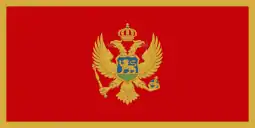 Montenegro – Marija Marković
Montenegro – Marija Marković Romania – Paula Seling
Romania – Paula Seling
(Romanian representative in 2010 and 2014) Austria – Kati Bellowitsch
Austria – Kati Bellowitsch Ukraine – Oleksiy Matias
Ukraine – Oleksiy Matias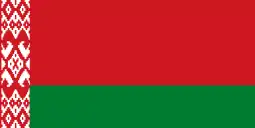 Belarus – Dmitry Koldun
Belarus – Dmitry Koldun
(Belarusian representative in 2007 Contest).svg.png.webp) Belgium – Peter Van de Veire
Belgium – Peter Van de Veire Azerbaijan – Safura Alizadeh
Azerbaijan – Safura Alizadeh
(Azeri representative in 2010 Contest)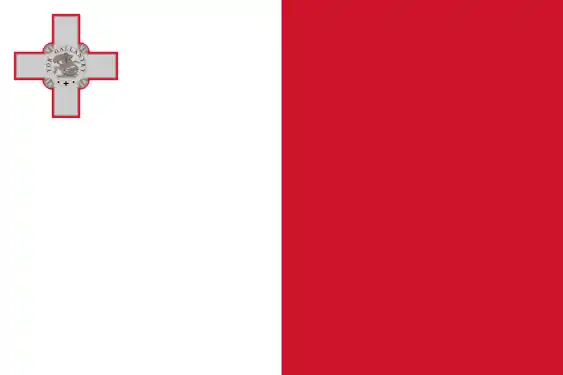 Malta – Keith Demicoli
Malta – Keith Demicoli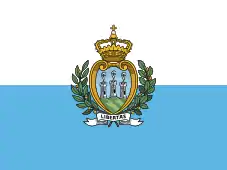 San Marino – Monica Fabbri
San Marino – Monica Fabbri France – Amaury Vassili
France – Amaury Vassili
(French representative in 2011 Contest) United Kingdom – Scott Mills
United Kingdom – Scott Mills Turkey – Ömer Önder
Turkey – Ömer Önder Greece – Adriana Magania
Greece – Adriana Magania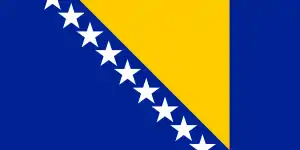 Bosnia and Herzegovina – Elvir Laković Laka
Bosnia and Herzegovina – Elvir Laković Laka
(Bosnian representative in 2008 Contest)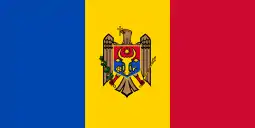 Moldova – Olivia Fortuna
Moldova – Olivia Fortuna Bulgaria – Anna Angelova
Bulgaria – Anna Angelova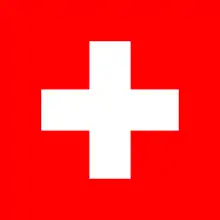 Switzerland – Sara Hildebrand
Switzerland – Sara Hildebrand Slovenia – Lorella Flego
Slovenia – Lorella Flego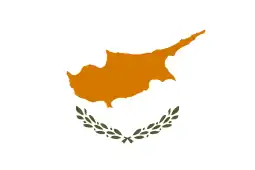 Cyprus – Loucas Hamatsos
Cyprus – Loucas Hamatsos Croatia – Nevena Rendeli
Croatia – Nevena Rendeli Slovakia – Mária Pietrová
Slovakia – Mária Pietrová Macedonia – Kristina Talevska
Macedonia – Kristina Talevska Netherlands – Viviënne van den Assem
Netherlands – Viviënne van den Assem Portugal – Joana Teles
Portugal – Joana Teles Iceland – Matthías Matthíasson
Iceland – Matthías Matthíasson
(Icelandic representative in 2011 Contest as part of Sjonni's Friends) Sweden – Sarah Dawn Finer
Sweden – Sarah Dawn Finer
(as Lynda Woodruff)[101] Norway – Nadia Hasnaoui
Norway – Nadia Hasnaoui
(Co-Host of 2010 Contest) Lithuania – Ignas Krupavičius
Lithuania – Ignas Krupavičius Estonia – Getter Jaani
Estonia – Getter Jaani
(Estonian representative in 2011 Contest) Denmark – Louise Wolff
Denmark – Louise Wolff Latvia – Valters Frīdenbergs
Latvia – Valters Frīdenbergs
(Latvian representative in 2005 Contest as part of Valters and Kaža) Spain – Elena S. Sánchez
Spain – Elena S. Sánchez Finland – Mr Lordi
Finland – Mr Lordi
(Winner of 2006 Contest as lead singer of Lordi) Georgia – Sopho Toroshelidze
Georgia – Sopho Toroshelidze
(Georgian representative in 2011 Contest as part of Eldrine) Italy – Ivan Bacchi
Italy – Ivan Bacchi Serbia – Maja Nikolić
Serbia – Maja Nikolić Germany – Anke Engelke
Germany – Anke Engelke
(Co-Host of 2011 Contest) Russia – Oxana Fedorova
Russia – Oxana Fedorova Hungary – Éva Novodomszky
Hungary – Éva Novodomszky Israel – Ofer Nachshon
Israel – Ofer Nachshon Ireland – Gráinne Seoige10
Ireland – Gráinne Seoige10
Notes
10.^ Ireland was originally scheduled to announce its votes as the 32nd country, but instead voted 42nd (last). The reason for this was technical difficulties in the minutes running up to the voting presentation.
Commentators
Most countries sent commentators to Baku or commentated from their own country, in order to add insight to the participants and, if necessary, the provision of voting information.
Participating countries
The commentators of the 42 participating countries were as follows:
| Country | SF1 / SF2 / Grand final | Commentator(s) |
|---|---|---|
| SF2 & Grand final | Andri Xhahu | |
| All | Andi Knoll (ORF eins) | |
| Grand final | Stermann & Grissemann (ORF eins) | |
| Grand final | Lukas Plöchl (ORF eins) | |
| All | Konul Arifgizi (İctimai Televiziya və Radio Yayımları Şirkəti) | |
| Saleh Baghirov (İctimai Televiziya və Radio Yayımları Şirkəti) | ||
| All | Denis Kurian (Belarus 1) | |
| All | Jean-Pierre Hautier (French, La Une) | |
| Jean-Louis Lahaye (French, La Une) | ||
| André Vermeulen (Dutch, één) (Dutch, Radio 2) | ||
| Peter Van de Veire(Dutch, één) (Dutch, Radio 2) | ||
| All | Dejan Kukrić (BHT1) | |
| All | Elena Rosberg (BNT) | |
| Georgi Kushvaliev (BNT) | ||
| All | Duško Čurlić (HRT1) | |
| All | Melina Karageorgiou (RIK 1) | |
| All | Ole Tøpholm (DR1) | |
| All | Marko Reikop (ETV) | |
| All | Tarja Närhi (Finnish, Yle TV2, Yle HD) | |
| Tobias Larsson (Finnish, Yle TV2, Yle HD) | ||
| Sanna Kojo (Finnish, Yle Radio Suomi) | ||
| Jorma Hietamäki (Finnish, Yle Radio Suomi) | ||
| Eva Frantz (Swedish, Yle TV2) | ||
| Johan Lindroos (Swedish, Yle TV2) | ||
| SF2[113] | Audrey Chauveau (France Ô) | |
| Bruno Berberes (France Ô) | ||
| Grand final[114] | Cyril Féraud (France 3) | |
| Mireille Dumas (France 3) | ||
| Grand final[115] | Fabien Lecœuvre (France Bleu) | |
| Serge Poezevara (France Bleu) | ||
| All | Temo Kvirkvelia | |
| All | Peter Urban (Das Erste)[116] | |
| Tim Frühling (hr3)[117] | ||
| Thomas Mohr (NDR 2)[118] | ||
| All | Maria Kozakou (NET) | |
| All | Gábor Gundel Takács (m1) | |
| All | Hrafnhildur Halldorsdóttir (Sjónvarpið) | |
| All | Marty Whelan (RTÉ Two) (semi-finals), (RTÉ One) (grand final) | |
| Grand final | Shay Byrne (RTÉ Radio 1) | |
| Grand final | Zbyszek Zalinski (RTÉ Radio 1) | |
| All | No commentator | |
| SF1[123] | Federica Gentile (Rai 5) | |
| Grand final[124] | Filippo Solibello (Rai 2) | |
| Grand final | Marco Ardemagni (Rai 2) | |
| All[125] | Valters Frīdenbergs (LTV) | |
| Grand final[126] | Kārlis Būmeisters (LTV) | |
| All | Darius Užkuraitis (LRT) | |
| All | Karolina Petkovska (MRT) | |
| All | Elaine Saliba (TVM) | |
| Ronald Briffa (TVM) | ||
| All | Marcel Spătari (TRM) | |
| All | Dražen Bauković (TVCG1) | |
| Tamara Ivanković (TVCG1) | ||
| All | Jan Smit (TROS) | |
| Daniël Dekker (TROS) | ||
| All | Olav Viksmo-Slettan (NRK1) | |
| All | Pedro Granger (RTP1) | |
| All | Leonard Miron (TVR1) | |
| Gianina Corondan (TVR1) | ||
| All | Olga Shelest (Russia-1) | |
| Dmitry Guberniev (Russia-1) | ||
| All | Lia Fiorio (SMRTV) | |
| Gigi Restivo (SMRTV) | ||
| SF1 | Dragan Ilić (RTS1) | |
| SF2 & Grand final | Duška Vučinić-Lučić (RTS1) | |
| All | Roman Bomboš (Jednotka, Rádio Slovensko, RTVS) | |
| Grand final[136] | Daniel Baláž (Radio FM) | |
| Pavol Hubinák (Radio FM) | ||
| All | Andrej Hofer (RTVSLO) | |
| SF1 & Grand final | José María Íñigo (La 1), (La 2) | |
| All | Gina Dirawi (SVT1) | |
| Edward af Sillén (SVT1) | ||
| Björn Kjellman (SR P3) | ||
| Carolina Norén (SR P3) | ||
| German[139] | Sven Epiney (SF zwei) | |
| French[140] | Jean-Marc Richard & Nicolas Tanner (RTS Deux) | |
| Italian[141] | Clarissa Tami and Paolo Meneguzzi (RSI La 2, semi-finals and RSI La 1, grand final) | |
| All | Bülend Özveren (TRT 1) | |
| Erhan Konuk (TRT 1) | ||
| All | Timur Miroshnychenko (First National TV Channel) | |
| Tetiana Terekhova (First National TV Channel) | ||
| Semi-finals[144] | Scott Mills (BBC Three) | |
| Sara Cox (BBC Three) | ||
| Grand final[145] | Graham Norton (BBC One) | |
| Ken Bruce (BBC Radio 2)[146] |
Non-participating countries
The commentators of the non-participating countries were:
| Country | SF1/SF2/Grand final | Commentator(s) |
|---|---|---|
| Grand final | Gohar Gasparyan (AMPTV) | |
| Artur Grigoryan (AMPTV) | ||
| All | Julia Zemiro (SBS) | |
| Sam Pang (SBS) | ||
| Grand final | No commentators (CCTV-15, broadcast the grand final on 1 December 2013, shortened into two hours) | |
| All | Norberg Makhambetov (Arna Media) | |
| Kaldybek Zhaysanbay (Arna Media) | ||
| All | Elmar Osmonov (OTRK) | |
| Aibek Akmatov (OTRK) |
Official album
| Eurovision Song Contest: Baku 2012 | ||||
|---|---|---|---|---|
 | ||||
| Compilation album by | ||||
| Released | 4 May 2012 | |||
| Genre | Pop | |||
| Length |
| |||
| Label | Universal | |||
| Eurovision Song Contest chronology | ||||
| ||||
Eurovision Song Contest: Baku 2012 was a compilation album put together by the European Broadcasting Union, and released by Universal Music Group on 4 May 2012. The album featured all 42 songs that entered in the 2012 contest, including the semi-finalists that failed to qualify into the grand final.[151]
Charts
| Chart (2012) | Peak position |
|---|---|
| German Compilation Albums (Offizielle Top 100)[152] | 2 |
References
- Marco Brey (21 May 2012). "Live report from the First Semi-Final dress rehearsal". European Broadcasting Union. Archived from the original on 18 June 2012. Retrieved 15 July 2012.
- Jarmo Siim (10 May 2012). "Lena, Rybak, Bilan, Šerifović Eurovision interval acts". European Broadcasting Union. Archived from the original on 14 May 2013. Retrieved 15 July 2012.
- Jarmo Siim (2 May 2012). "Eurovision interval acts revealed". European Broadcasting Union. Archived from the original on 31 May 2013. Retrieved 15 July 2012.
- Jarmo Siim (16 April 2012). "Eldar, Nargiz, Leyla to host Eurovision 2012". European Broadcasting Union. Archived from the original on 3 September 2012. Retrieved 15 July 2012.
- "Eurovision 2012 Hosts: Leyla, Nargiz, Eldar". Oikotimes.com. 16 April 2012. Archived from the original on 22 June 2012. Retrieved 15 July 2012.
- "Azerbaijan's Eurovision rebirth". news.com.au. 16 May 2011. Archived from the original on 30 September 2013. Retrieved 15 July 2012.
- Daniel Sperling (14 May 2011). "Azerbaijan win Eurovision Song Contest 2011". Digital Spy. Archived from the original on 30 May 2012. Retrieved 15 July 2012.
- Тарана Мустафаева (17 May 2011). Для "Евровидения-2012" будет построена новая арена? (in Russian). anspress.com. Archived from the original on 6 October 2011. Retrieved 15 July 2012.
- "Special concert complex for Eurovision 2012 to be built in centre of Baku". abc.az. 16 May 2011. Archived from the original on 17 August 2011. Retrieved 9 August 2011.
- "Azerbaijan has not yet selected site for Eurovision 2012". abc.az. 19 May 2011. Archived from the original on 22 May 2011. Retrieved 9 August 2011.
- "German company to construct Modern Sport-Concert Complex in Azerbaijan's capital". en.apa.az. APA News Agency. Archived from the original on 25 March 2012. Retrieved 1 September 2011.
- "Second largest sport-concert complex to appear in Baku in April 2012". abc.az. FINEKO Analytic & Informational Agency. 1 September 2011. Archived from the original on 22 January 2012. Retrieved 1 September 2011.
- "General: Reference Group Baku Bound". ESCDaily.com. 29 August 2011. Archived from the original on 5 June 2012. Retrieved 15 July 2012.
- Jarmo Siim (25 January 2012). "Crystal Hall approved as Eurovision 2012 venue". European Broadcasting Union. Archived from the original on 3 December 2012. Retrieved 25 January 2012.
- "Venue likely to host Eurovision 2012 in Baku to be biggest ever in recent history of contest". Trend News Agency. 1 September 2011. Archived from the original on 3 October 2012. Retrieved 1 September 2011.
- Ryan Wilson (15 February 2012). "Baku 2012: Tickets on sale from 28th February". Australia: ESCXtra.com. Archived from the original on 13 May 2013. Retrieved 16 June 2012.
- "Reference Group of the Eurovision Song Contest". European Broadcasting Union. Archived from the original on 19 June 2012. Retrieved 16 July 2012.
- Bakker, Sietse (29 June 2011). "EBU restores televoting window as from 2012". European Broadcasting Union. Archived from the original on 10 August 2012. Retrieved 4 July 2011.
- "Extracts from the 2012 Eurovision Song Contest rules" (PDF). European Broadcasting Union. 24 November 2011. Archived from the original (PDF) on 21 March 2012. Retrieved 25 November 2011.
- "Eurovision Song Contest History". European Broadcasting Union. 24 May 2003. Archived from the original on 5 June 2011. Retrieved 16 June 2012.
- Escudero, Victor (25 January 2012). "Results of the Semi-Final allocation draw". European Broadcasting Union. Archived from the original on 6 July 2013. Retrieved 25 January 2012.
- Siim, Jarmo (21 January 2012). "Eurovision 2012 slogan presented on 25 January". European Broadcasting Union. Archived from the original on 10 August 2012. Retrieved 24 January 2012.
- Siim, Jarmo (19 March 2012). "Baku: All songs officially presented to EBU". European Broadcasting Union. Archived from the original on 13 July 2013. Retrieved 19 March 2012.
- Siim, Jarmo (25 January 2012). "Baku 2012: Light your fire!". European Broadcasting Union. Archived from the original on 5 February 2015. Retrieved 25 January 2012.
- "First Semi-Final concludes, we have ten finalists!". European Broadcasting Union. 22 May 2012. Archived from the original on 10 July 2012. Retrieved 7 June 2012.
- "Second Semi-Final: We have our ten qualifiers". European Broadcasting Union. 24 May 2012. Archived from the original on 30 May 2012. Retrieved 7 June 2012.
- "Eurovision Song Contest 2012 Official Logo + Visual Identity". Turquoise Branding. 25 January 2012. Archived from the original on 30 May 2012. Retrieved 25 May 2012.
- "Baku 2012: Light your fire!". European Broadcasting Union. 25 January 2012. Archived from the original on 5 February 2015. Retrieved 7 June 2012.
- Siim, Jarmo (29 August 2011). "Eurovision Song Contest governing body to meet in Baku first time". European Broadcasting Union. Archived from the original on 10 August 2012. Retrieved 31 August 2011.
- "Host broadcaster in 2012". European Broadcasting Union. 24 August 2011. Archived from the original on 24 September 2011. Retrieved 24 August 2011.
- "Azercell becomes Eurovision 2012 Presenting Partner". Azercell Telecom LLC Press Service. 16 August 2011. Archived from the original on 18 September 2011. Retrieved 24 August 2011.
- "Brainpool chosen Eurovision 2012 Production Partner". EBU. 1 December 2011. Archived from the original on 13 July 2013. Retrieved 3 February 2012.
- Siim, Jarmo (17 January 2012). "43 countries represented at Eurovision 2012". European Broadcasting Union. Archived from the original on 12 October 2014. Retrieved 17 January 2012.
- "Eurovision Song Contest 2009 Final". European Broadcasting Union. 16 May 2009. Archived from the original on 18 December 2015. Retrieved 17 June 2012.
- Siim, Jarmo (7 March 2012). "Armenia withdraws from Eurovision 2012". EBU. Archived from the original on 26 August 2014. Retrieved 12 March 2012.
- Pozzi, Renee (19 November 2011). "FYR Macedonia: Kaliopi internally selected to Baku!". ESCDaily.com. Archived from the original on 16 June 2013. Retrieved 25 May 2012.
- "Eurovision Song Contest 1996". European Broadcasting Union. 18 May 1996. Archived from the original on 31 December 2010. Retrieved 17 June 2012.
- G, Luke (11 February 2012). "Baku 2012: "Mundu eftir mér" for Iceland". ESCDaily.com. Archived from the original on 15 June 2013. Retrieved 25 May 2012.
- Mourinho, Daniel (5 May 2012). "Željko Joksimović returns to Eurovision". ESC Radio. Archived from the original on 13 May 2013. Retrieved 25 May 2012.
- "Eurovision Song Contest 2004 Final". European Broadcasting Union. 15 May 2004. Archived from the original on 31 December 2010. Retrieved 17 June 2012.
- G, Luke (25 February 2012). "Ireland: Jedward return with "Waterline"". ESCDaily.com. Archived from the original on 26 February 2012. Retrieved 25 May 2012.
- "Eurovision Song Contest 2011 Final". EBU. 14 May 2011. Archived from the original on 1 July 2012. Retrieved 17 June 2012.
- "First Eurovision winner Lys Assia submitted a song in the Swiss selection". Archived from the original on 1 January 2012. Retrieved 23 May 2013.
- "Lys Assia". Les archives de la Radio télévision suisse (in French). Radio télévision suisse. Le projet de numérisation des archives de la RTS. 6 November 2011. Retrieved 23 May 2013.
Document
- Teuber, Verena (1 July 2012). "Eurovision weekend held in Berlin from 3 August-5 August". OGAE Germany. Retrieved 25 March 2018.
- "Albania to broadcast tonights semifinal deferred". European Broadcasting Union. 22 May 2012. Archived from the original on 23 May 2012. Retrieved 22 May 2012.
- "Results of the 2012 Running Order Draw!". European Broadcasting Union. 20 March 2012. Archived from the original on 5 July 2012. Retrieved 7 April 2012.
- "Participants of Baku 2012 - Eurovision Song Contest". European Broadcasting Union. Retrieved 5 December 2019.
- "Eurovision Song Contest 2012". The Diggiloo Thrush. Archived from the original on 29 March 2012. Retrieved 5 March 2012.
- "Lyrics of "Love unlimited"". European Broadcasting Union. Archived from the original on 8 June 2012. Retrieved 15 July 2012.
- Hondal, Victor (18 June 2012). "Split Jury and Televoting results announced". ESCToday.com. Archived from the original on 19 June 2012. Retrieved 18 June 2012.
- Siim, Jarmo (18 June 2012). "Eurovision 2012 split jury-televote results revealed". European Broadcasting Union. Archived from the original on 31 May 2013. Retrieved 18 June 2012.
- "Scoreboard: Eurovision Song Contest 2012 Semi-Final 1". European Broadcasting Union. 27 May 2012. Archived from the original on 5 June 2012. Retrieved 27 May 2012.
- "Scoreboard: Eurovision Song Contest 2012 Semi-Final 2". European Broadcasting Union. 27 May 2012. Archived from the original on 18 May 2012. Retrieved 27 May 2012.
- "Scoreboard: Eurovision Song Contest 2012 Final". European Broadcasting Union. 27 May 2012. Archived from the original on 22 January 2013. Retrieved 27 May 2012.
- Nuhiu, Rinor (10 November 2011). "Andorra: RTVA to quit the European Broadcasting Union!". ESCDaily. Archived from the original on 16 June 2013. Retrieved 16 June 2012.
- "Andorra: No return planned for 2012". ESCDaily.com. 19 October 2011. Archived from the original on 22 October 2011. Retrieved 19 October 2011.
- Ilham Aliyev (28 February 2012). "Closing Speech by Ilham Aliyev at the conference on the results of the third year into the "State Program on the socioeconomic development of districts for 2009-2013"". President of Azerbaijan. Archived from the original on 11 June 2014. Retrieved 15 July 2012.
- "Armenia pulls out of Azerbaijan-hosted Eurovision show". BBC News. 7 March 2012. Archived from the original on 5 June 2012. Retrieved 2 June 2012.
- Anna Barseghian; Daisy Sindelar (22 May 2012). "No Saturday Night Fever, As Armenia Mulls Eurovision Blackout". Radio Free Europe/Radio Liberty. Archived from the original on 14 July 2012. Retrieved 15 July 2012.
- Melnikov, Valery (3 May 2012). "Armenia Fined for Refusal to Take Part in Eurovision 2012". Moscow: RIA Novosti. Archived from the original on 25 June 2012. Retrieved 3 May 2012.
- Nuhiu, Rinor (2 May 2012). "EBU: Armenia to face sanctions for late withdrawal". ESC Daily. Archived from the original on 8 May 2012. Retrieved 3 May 2012.
- Резолюция СБ ООН № 822 от 30 апреля 1993 года (in Russian). United Nations Security Council. 30 April 1993. Archived from the original on 3 May 2011. Retrieved 4 January 2011.
- "Czech Republic: No return in Baku". ESCDaily.com. 24 November 2011. Archived from the original on 28 November 2011. Retrieved 24 November 2011.
- "Is Liechtenstein an EBU Member?". Eurovision Times. 26 November 2011. Archived from the original on 22 May 2012. Retrieved 17 January 2012.
- "No Participation of Liechtenstein at Eurovision 2012". Eurovision Times. 29 November 2011. Archived from the original on 15 June 2012. Retrieved 17 January 2012.
- "Luxembourg: No participation in Eurovision 2012". EurovisionTimes. 31 December 2011. Archived from the original on 8 March 2012. Retrieved 16 June 2012.
- "Monaco: Talks about a return at Eurovision". EurovisionTimes. 23 November 2011. Archived from the original on 26 May 2012. Retrieved 16 June 2012.
- "Monaco: Dampned Expectations". EurovisionTimes. 3 December 2011. Archived from the original on 2 January 2012. Retrieved 16 June 2012.
- "Morocco bids to take part in Eurovision". News.Az. 3 August 2011. Archived from the original on 23 August 2011. Retrieved 9 August 2011.
- "Bakıdakı "Eurovision" da Afrika ölkəsi iştirak edə bilər". Gün.Az (in Azerbaijani). 3 August 2011. Archived from the original on 29 November 2011. Retrieved 9 August 2011.
- Pozzi, Renee (7 November 2011). "Poland: TVP to make participation decision on November 24th". ESCDaily. Archived from the original on 15 June 2013. Retrieved 16 June 2012.
- G, Luke (16 December 2011). "Poland: TVP withdraws from Eurovision 2012". ESCDaily. Archived from the original on 29 May 2012. Retrieved 16 June 2012.
- "Eurovision 2012: No List of Participants, No Venue, No Tickets... No Hope?". Eurovision Times. 8 January 2012. Archived from the original on 14 January 2012. Retrieved 13 January 2012.
- "EBU: List of Participants To Be Released Next Week". Eurovision Times. 13 January 2012. Archived from the original on 4 March 2012. Retrieved 15 January 2012.
- Leonard, Peter (26 May 2012). "Azerbaijan hopes Eurovision Song Contest will distract from poor human rights record". Global Edmonton. Archived from the original on 6 December 2012. Retrieved 15 July 2012.
- Elder, Miriam (25 May 2012). "Eurovision does little help to human rights in Azerbaijan". The Guardian. Archived from the original on 24 October 2014. Retrieved 26 May 2012.
- Gogia, Giorgi (23 May 2012). "Eurovision: The view from the courtroom". The Wall Street Journal. Retrieved 26 May 2012.
- Margarita Antidze (25 May 2012). "Swedish Eurovision star strays into Azeri rights row". Reuters. Archived from the original on 29 May 2012. Retrieved 26 May 2012.
- "Azerbaijan: Homeowners Evicted for City Beautification. Some Forced Out Ahead of Eurovision 2012". Human Rights Watch. 29 February 2012. Archived from the original on 4 August 2012. Retrieved 6 March 2012.
- McGuinness, Damien (22 December 2011). "Evicted in Baku to make way for Eurovision". BBC News. Archived from the original on 19 May 2012. Retrieved 17 May 2012.
- "Azerbaidzhan syyttaa ruotsin viisuedustajaa politikoinnista" (in Finnish). YLE. 24 May 2012. Archived from the original on 27 May 2012. Retrieved 15 July 2012.
- "Loreen mitt i diplomatiskt drama". Dagens Nyheter (in Swedish). 24 May 2012. Archived from the original on 28 July 2012. Retrieved 15 July 2012.
- "Umstrittener Eurovision Song Contest. Danke, Anke!". Der Spiegel (in German). 27 May 2012. Archived from the original on 8 August 2012. Retrieved 15 July 2012.
- "Anke's brave message to Baku - Final Eurovision 2012". 27 May 2012. Archived from the original on 14 April 2014. Retrieved 15 July 2012 – via YouTube.
- Antidze, Margarita (22 May 2012). "Iran's "gay" Eurovision jibes strain Azerbaijan ties". Reuters. Archived from the original on 31 May 2012. Retrieved 15 July 2012.
- Lomsadze, Girgoi (21 May 2012). "Azerbaijan: Pop Music vs. Islam". EurasiaNet.org. Archived from the original on 11 July 2012. Retrieved 15 July 2012.
- "Iran recalls envoy to Azerbaijan ahead of Eurovision". AFP. 22 May 2012. Archived from the original on 27 June 2012. Retrieved 15 July 2012.
- "Azerbaijan Demands Apology From Iran Over Eurovision". Voice of America. 24 May 2012. Archived from the original on 26 June 2012. Retrieved 15 July 2012.
- "Azerbaijan Recalls Ambassador To Iran". Radio Free Europe/Radio Liberty. 30 May 2012. Archived from the original on 24 July 2012. Retrieved 15 July 2012.
- Mammadov, Elman (30 May 2012). "Eurovision 'terror plot' thwarted: Azerbaijan". American Free Press. Google News. Archived from the original on 6 July 2013. Retrieved 15 July 2012.
- Coughlin, Con (23 August 2012). "Iran's supreme leader orders fresh terror attacks on West". The Daily Telegraph. Archived from the original on 22 August 2012. Retrieved 22 August 2012.
- "Marcel Bezençon Award - an introduction". Poplight.se. Archived from the original on 17 October 2013. Retrieved 15 July 2012.
- Roxburgh, Gordon (27 May 2012). "Winners of the Marcel Bezençon Awards 2012". European Broadcasting Union. Archived from the original on 26 August 2012. Retrieved 15 July 2012.
- "Eurovision Fanclub Network". OGAE. Archived from the original on 19 April 2013. Retrieved 15 June 2012.
- "Club History" (in Finnish). OGAE Finland. 5 June 2012. Archived from the original on 10 August 2012. Retrieved 17 June 2012.
- Hondal, Victor (25 May 2012). "OGAE 2012 poll: Sweden wins by a landslide". ESCToday.com. Archived from the original on 19 June 2012. Retrieved 15 July 2012.
- "Barbara Dex Award". eurovisionhouse.nl. 2012. Archived from the original on 26 August 2014. Retrieved 13 June 2014.
- Roxburgh, Gordon (8 June 2015). "Rona Nishliu wins the Barbara Dex Award". eurovision.tv. European Broadcasting Union. Archived from the original on 5 June 2012. Retrieved 3 June 2012.
- Roxburgh, Gordon (26 May 2012). "Running order for the voting tonight". European Broadcasting Union. Archived from the original on 18 June 2012. Retrieved 26 May 2012.
- Mirja Bokholm (22 April 2013). "YOHIO presenterar de svenska rösterna i Eurovision Song Contest". SVT.se (in Swedish). Archived from the original on 26 April 2013. Retrieved 22 April 2013.
- "Song Contest mit Stermann & Grissemann". ORF.at (in German). 1 May 2011. Archived from the original on 9 May 2012. Retrieved 12 May 2012.
- "Trackshittaz: Mit schlechter Quote gen Baku". Kurier (in German). 10 May 2012. Archived from the original on 11 May 2012. Retrieved 12 May 2012.
- "Lukas Plöchl kommentiert im TV". news.at (in German). 25 May 2012. Archived from the original on 29 May 2012. Retrieved 21 June 2012.
- "Könül Arifqızı və Saleh Bağırov "Eurovision-2012"ni şərh edəcək". Gun.az (in Azerbaijani). 15 May 2012. Archived from the original on 16 May 2012. Retrieved 15 May 2012.
- "André Vermeulen en Peter Van De Veire worden commentator bij Eurovisiesongfestival". Knack.be. 26 April 2012. Archived from the original on 25 July 2013. Retrieved 26 April 2012.
- "Eurovision 2012: Le duo Hautier-Lahaye reste à Bruxelles!". cinetelerevue.be. 18 April 2012. Archived from the original on 25 July 2013. Retrieved 26 April 2012.
- "Eurosong 2012 – Baku". BHRT. 15 May 2012. Archived from the original on 29 July 2012. Retrieved 25 May 2012.
- "Melina to comment from Cyprus" (in Greek). 18 May 2012. Archived from the original on 20 May 2012. Retrieved 15 July 2012.
- "Tøpholm skal kommentere dansk Grand Prix". DR (in Danish). 28 December 2011. Archived from the original on 6 March 2012. Retrieved 14 May 2012.
- "Eurovision laulukilpailun 42 kilpailubiisiä lauantai-illan esikatselumaratonissa". Yle (in Finnish). Archived from the original on 23 May 2012. Retrieved 11 May 2012.
- "Eurovision 2012: Euroviisujen ensimmäinen karsinta" (in Finnish). YLE. Retrieved 24 May 2012.
- "Programme de Le 57ème Concours Eurovision de la chanson". France Télévisions (in French). Archived from the original on 29 April 2009. Retrieved 8 May 2012.
- "Soirée fun en vue: Mireille Dumas et Cyril Féraud commenteront l'Eurovision". L'Express. 12 March 2012. Archived from the original on 29 May 2012. Retrieved 13 March 2012.
- "On repeint la musique sur France Bleu" (in French). France Bleu. Retrieved 1 June 2012.
- "ESC 2012 Eurovision Song Contest 2012" (in German). ARD. 18 May 2012. Retrieved 18 May 2012.
- "Eurovision Song Contest 2012". hr (in German). 24 May 2012. Archived from the original on 27 May 2012. Retrieved 1 June 2012.
- "NDR 2 Spezial: Der umstrittene ESC in Baku" (in German). NDR. 24 May 2012. Archived from the original on 13 May 2013. Retrieved 24 May 2012.
- ΕΛΛΑΔΑ: ….τελικά η Μαρία Κοζάκου ταξιδεύει στο Μπακού!. OGAE (in Greek). 30 April 2012. Archived from the original on 9 May 2012. Retrieved 15 July 2012.
- "Gunda goes to the Eurovision Song Contest". blikk.hu (in Hungarian). 12 December 2012. Archived from the original on 7 January 2012. Retrieved 7 January 2012.
- "Hellulagt í lakkskóm í Baku" (in Icelandic). RÚV. 14 May 2012. Archived from the original on 7 January 2014. Retrieved 15 July 2012.
- "Eurovision just won't be the same without Larry, admits Marty". Herald.ie. 20 April 2012. Archived from the original on 1 May 2012. Retrieved 2 May 2012.
- "Non solo Gialappa's Band: la semifinale a Federica Gentile (Radio 2)". eurofestival.ws (in Italian). 12 May 2012. Archived from the original on 9 August 2012. Retrieved 12 May 2012.
- "La finale dell'Eurovision 2012 affidata a Solibello e Ardemagni (Radio 2)". eurofestival.ws (in Italian). 18 May 2012. Archived from the original on 28 May 2012. Retrieved 18 May 2012.
- "Anmary gatava Eirovīzijas pusfinālam" (in Latvian). Tvnet.lv. 21 May 2012. Archived from the original on 23 May 2012. Retrieved 21 May 2012.
- "Noskaties, kādas dziesmas piedalīsies Eirovīzijas finālā VIDEO" (in Latvian). Kasjauns.lv. 26 May 2012. Archived from the original on 29 May 2012. Retrieved 26 May 2012.
- Woning, Merike (28 October 2011). "Jan Smit heeft altijd slingers op zak – Metro". metronieuws.nl. Archived from the original on 8 November 2011. Retrieved 14 January 2012.
- "Welkom op de site van Eurovision Artists". Eurovisionartists.nl. 17 April 2012. Archived from the original on 8 August 2012. Retrieved 17 April 2012.
- "Eurovision Song Contest 2012 – finale". NRK (in Norwegian). 15 May 2012. Retrieved 15 May 2012.
- "57.º Festival Eurovisão da Canção 2012". rtp.pt. 17 May 2012. Archived from the original on 15 May 2013. Retrieved 17 May 2012.
- "Romanian television schedule". PORT.ro (in Romanian). 20 May 2012. Archived from the original on 21 May 2012. Retrieved 20 May 2012.
- "Евровидение-2012". Russia.tv. 25 May 2012. Archived from the original on 26 May 2012. Retrieved 25 May 2012.
- "Ecco il video ufficiale de "L'amore è femmina". E San Marino..." eurofestival.ws (in Italian). 7 May 2012. Archived from the original on 25 August 2012. Retrieved 25 May 2012.
- "Pesma Evrovizije 2012". RTS (in Serbian). 19 May 2012. Archived from the original on 21 May 2012. Retrieved 19 May 2012.
- "Úspechy Romana Bomboša: Svadba, ocenenie a Eurovízia priamo v Baku!". eurovisionslovakia.blogspot.com (in Slovak). 5 May 2012. Archived from the original on 21 September 2013. Retrieved 5 May 2012.
- "Eurovízia s Balážom a Hubinákom - vyberajte najlepší komentár!". RTVS. 29 May 2012. Archived from the original on 16 May 2018. Retrieved 15 May 2018.
- "José María Íñigo repite como comentarista de TVE en el Festival de Eurovisión". RTVE (in Spanish). 30 April 2012. Archived from the original on 30 April 2012. Retrieved 30 April 2012.
- "Gina Dirawi och Edward af Sillén kommenterar Eurovision Song Contest". Sveriges Television (in Swedish). 17 April 2012. Archived from the original on 27 April 2012. Retrieved 17 April 2012.
- "TV-Programm 26. Mai 2012". Schweizer Fernsehen (in German). 10 May 2012. Archived from the original on 28 May 2012. Retrieved 10 May 2012.
- "mardi 22 mai à 21:00 sur RTS Deux Eurosong 2012 22. Mai 2012". Télévision Suisse Romande (in French). 18 May 2012. Archived from the original on 13 May 2012. Retrieved 18 May 2012.
- "martedì 22 maggio 2012, 21:00 sur RSI La 2 Eurosong 2012". Radiotelevisione svizzera di lingua italiana (in Italian). 19 May 2012. Archived from the original on 23 May 2012. Retrieved 19 May 2012.
- "Özveren'in veliahtı kim?". posta.com.tr (in Turkish). 15 April 2012. Archived from the original on 29 April 2012. Retrieved 1 May 2012.
- "Пісенне Євробачення 2012 – Перший Національний канал" (in Ukrainian). 1tv.com.ua. 20 April 2012. Archived from the original on 29 April 2013. Retrieved 25 May 2012.
- "BBC One – Eurovision Song Contest, 2012, Semi Final 1". BBC. Archived from the original on 25 May 2012. Retrieved 13 April 2012.
- "BBC – Eurovision Song Contest 2012". BBC Online. Archived from the original on 23 December 2011. Retrieved 27 February 2012.
- "BBC – Media Centre – BBC Eurovision Song Contest Coverage 2012". BBC Online. Archived from the original on 25 July 2013. Retrieved 2 May 2012.
- "Armenia is back for 2013". OGAE. 28 May 2012. Archived from the original on 14 July 2013. Retrieved 6 June 2012.
- Knox, David (3 May 2011). "Airdate: Eurovision Song Contest 2012". tvtonight.com.au. Archived from the original on 11 May 2012. Retrieved 9 May 2012.l
- "SBS TO AIR EUROVISION 2012". Oikotimes.com. 13 October 2011. Archived from the original on 9 September 2012. Retrieved 7 April 2012.
- "Kazakhstan to broadcast Eurovision 2012!". Eurovision Diary. 19 May 2012. Archived from the original on 28 May 2012. Retrieved 19 May 2012.
- "Eurovision Song Contest - Baku 2012". itunes.apple.com. iTunes. 1 May 2012. Archived from the original on 24 December 2014. Retrieved 4 November 2014.
- "Eurovision Song Contest 2012". Offiziellecharts.de. GfK Entertainment Charts. Retrieved 17 March 2018.
External links
| Wikimedia Commons has media related to Eurovision Song Contest 2012. |

